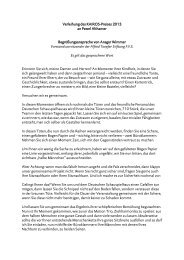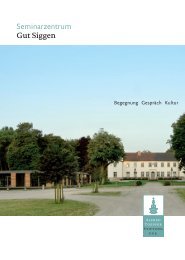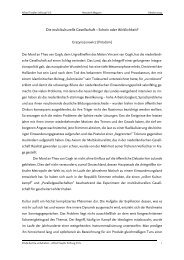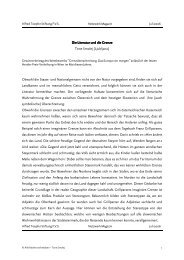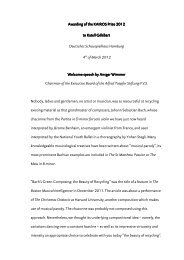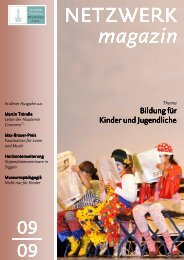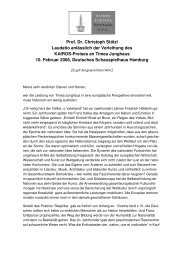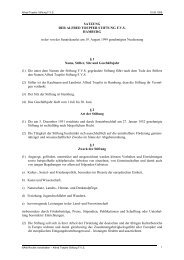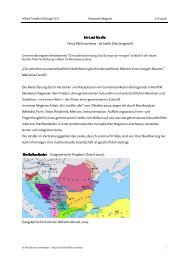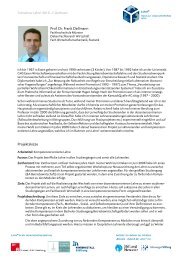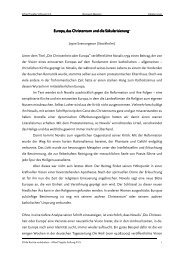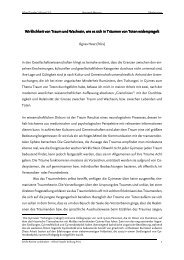Brief von Ansgar Wimmer an Dr. Michael Pinto-Duschinsky
Brief von Ansgar Wimmer an Dr. Michael Pinto-Duschinsky
Brief von Ansgar Wimmer an Dr. Michael Pinto-Duschinsky
You also want an ePaper? Increase the reach of your titles
YUMPU automatically turns print PDFs into web optimized ePapers that Google loves.
<strong>Ansgar</strong> <strong>Wimmer</strong><br />
Vorsitzender des Vorst<strong>an</strong>des<br />
Telefon (040) 33 40 210<br />
Telefax (040) 33 58 60<br />
wimmer@toepfer-fvs.de<br />
Herrn <strong>Dr</strong>. <strong>Michael</strong> <strong>Pinto</strong>-<strong>Duschinsky</strong><br />
<strong>Dr</strong>. <strong>Michael</strong> <strong>Pinto</strong>-<strong>Duschinsky</strong><br />
92 Hamilton Road<br />
GB Oxford OX2 7QA, Großbrit<strong>an</strong>nien<br />
A l f r e d<br />
T o e p f e r<br />
S t i f t u n g<br />
f . v . s .<br />
Hamburg, J<strong>an</strong>uary 11, 2010<br />
Dear <strong>Dr</strong>. <strong>Pinto</strong>-<strong>Duschinsky</strong>,<br />
I am writing to you today in reference to our telephone conversation last Monday <strong>an</strong>d in<br />
response to our email exch<strong>an</strong>ges. At the current stage <strong>an</strong>d prior to a discussion with the<br />
subcommittee established by Oxford University I think it may be useful to summarize our<br />
different exch<strong>an</strong>ges in order to identify those areas, where we may be in agreement as<br />
well as those, where disagreements between us presumably remain.<br />
Before entering into this I would — once more — like to emphasize that I do continue our<br />
discussion with full respect as to the biographical <strong>an</strong>d personal aspects that are the<br />
background <strong>an</strong>d motivation for your historical research. I have come to underst<strong>an</strong>d our<br />
exch<strong>an</strong>ge rather as a joint quest for proper ways of dealing with the past rather th<strong>an</strong> as a<br />
hostile exch<strong>an</strong>ge of arguments about the present. The issue at h<strong>an</strong>d is a very serious one<br />
for both sides <strong>an</strong>d needs great care <strong>an</strong>d precision, both with the facts <strong>an</strong>d with the ethical<br />
questions involved.<br />
The position I take in the following elaboration solely reflect the opinion of the<br />
org<strong>an</strong>isation I represent, the Alfred Toepfer Stiftung F.V.S.. As you may see from the<br />
statutes of our foundation published on the Internet, our foundation today operates<br />
independently from members or opinions of the Toepfer family. These statutes stipulate<br />
that not more th<strong>an</strong> two out of a total of seven seats c<strong>an</strong> be held by members of the family<br />
on the supervisory board of our foundation. Given that all of Alfred Toepfer’s surviving<br />
children have passed the statutory age limit (75), there is effectively only one seat<br />
reserved for family members on our board now.<br />
It is obvious from these rules that this foundation was not designed by its founder to be<br />
dominated or primarily influenced by his family, but rather to be guided by experts in its<br />
fields of activity. While the supervisory board is currently chaired by Birte Toepfer, a<br />
A l f r e d T o e p f e r<br />
S t i f t u n g f . v . s .<br />
Georgsplatz 10<br />
D-20099 Hamburg<br />
Telefon (040) 33 402-0<br />
Telefax (040) 33 58-60<br />
www.toepfer-fvs.de<br />
Vorst<strong>an</strong>d<br />
<strong>Ansgar</strong> <strong>Wimmer</strong> (Vorsitzender)<br />
Dipl. Kfm. Andreas Holz
A l f r e d<br />
T o e p f e r<br />
S t i f t u n g<br />
f . v . s .<br />
daughter-in-law of Alfred Toepfer, this has not always been the case <strong>an</strong>d does not<br />
constitute a domin<strong>an</strong>t influence of the Toepfer family. It may also be useful for you to<br />
know that there are rather diverse views within the Toepfer family on both the biography<br />
of Alfred Toepfer <strong>an</strong>d his historical responsibilities.<br />
After these introductory comments I would now like to summarize those aspects of our<br />
discussion which may be consensual between us before proceeding to issues where we<br />
may differ in subst<strong>an</strong>ce or opinion.<br />
I.<br />
1.<br />
The Alfred Toepfer Stiftung F.V.S. today is determined to create full tr<strong>an</strong>sparency as to its<br />
own past <strong>an</strong>d to the biography of its founder. This is particularly true to Toepfer’s support<br />
for <strong>an</strong>d dealings with Germ<strong>an</strong>y’s Nazi regime in the 1930’s <strong>an</strong>d 1940’s as well as to<br />
continuities after the war. Given Germ<strong>an</strong>y’s past, this foundation is particularly sensitive<br />
to <strong>an</strong>y presumed or factual linkage of Alfred Toepfer to the Holocaust or <strong>an</strong>y other aspect<br />
of hum<strong>an</strong> suffering caused by persecution <strong>an</strong>d aggression prior <strong>an</strong>d during WW II. As this<br />
foundation has inherited parts of Toepfer’s personal wealth as well as revenues generated<br />
from Toepfer’s economic enterprises it is under strict obligation to ensure that it is not<br />
operating today with funds unlawfully generated from criminal actions or morally<br />
inacceptable economic behaviour before, during or after WW II.<br />
2.<br />
Given these obligations it is the Alfred Toepfer Stiftung F.V.S. s’ duty not only to allow for<br />
but also to promote independent, critical historical research on Alfred Toepfer <strong>an</strong>d his<br />
role in this difficult period of Germ<strong>an</strong> <strong>an</strong>d Europe<strong>an</strong> history. Within it’s legally defined<br />
terms of operation there is a particular need to be open <strong>an</strong>d responsive towards<br />
initiatives, projects <strong>an</strong>d programmes which help to critically explore the past, honour <strong>an</strong>d<br />
commemorate the victims, work towards reconciliation <strong>an</strong>d aim to prevent history from<br />
repeating itself.<br />
3.<br />
Within the last ten years historical research — in m<strong>an</strong>y inst<strong>an</strong>ces promoted, supported or<br />
sponsored by the Alfred Toepfer Stiftung F.V.S.— has uncovered a signific<strong>an</strong>t number of<br />
disturbing facts about Alfred Toepfer’s support for <strong>an</strong>d dealings with Germ<strong>an</strong>y’s Nazi<br />
regime in the 1930’s <strong>an</strong>d 1940’s as well as irritating continuities after the war. Other facts
A l f r e d<br />
T o e p f e r<br />
S t i f t u n g<br />
f . v . s .<br />
have always been known, but have not been the issue of a major critical public discussion<br />
or historical review during Alfred Toepfer’s lifetime.<br />
Among them are:<br />
• his sympathy <strong>an</strong>d support for the “Volkstumspolitik” of the ‘Third Reich’,<br />
particularly with a focus on ethnic Germ<strong>an</strong> communities „<strong>an</strong> den Grenzen des<br />
Reiches“, particularly those in the Alsace.<br />
• his close contacts with individual high-r<strong>an</strong>king representatives of the Nazi Regime<br />
• his collaboration with - <strong>an</strong>d support for — some cultural policies <strong>an</strong>d priorities of<br />
the Nazi regime, particularly through activities in the area of cultural <strong>an</strong>d<br />
academic awards <strong>an</strong>d scholarships<br />
• his support for org<strong>an</strong>izations which were either closely affiliated with or <strong>an</strong><br />
integral part of the Nazi regime such as the VDA, particularly through offering his<br />
foundation’s Kalkhorst Estate for their activities as a „Reichsführerschule“<br />
• his role as a „Wehrmachts Offizier in der Abwehr“ from 1940 to 1945, particularly<br />
his economic activities in Fr<strong>an</strong>ce 1943/1944 generating resources for the Germ<strong>an</strong><br />
war effort<br />
• individual tr<strong>an</strong>sactions of subsidiary firms of the Toepfer Enterprises during WW<br />
II, which delivered goods such as ‘Löschkalk’ to the Ghetto of Lodz<br />
• his continuing support for <strong>an</strong>d recruitment for his businesses of high-r<strong>an</strong>king<br />
officials of the Nazi regime heavily implicated through their participation in the<br />
Genocide, after WW II such as Edmund Veesenmayer, Kurt Haller, H<strong>an</strong>s Joachim<br />
Riecke <strong>an</strong>d others<br />
• his longst<strong>an</strong>ding cooperation <strong>an</strong>d working relationship with officials, academics<br />
<strong>an</strong>d other individuals which at different points or through different actions<br />
actively supported the Nazi regime, it’s aggression as well as it’s racist policies,<br />
within his foundation work during <strong>an</strong>d after WW II such as Konrad Henlein,<br />
Gustav Adolf Rein, Friedrich Metz, Joh<strong>an</strong>n Friedrich Blunck, Georg Rauschning<br />
• his support or sponsorship for a number of prize winners of his foundations<br />
implicated through either their support or their active involvement in the Nazi<br />
regime in the years after WW II<br />
These findings become even more disturbing by the fact that Toepfer, while becoming a<br />
widely known phil<strong>an</strong>thropist, active in the field of nature conservation <strong>an</strong>d champion of<br />
Europe<strong>an</strong> integration <strong>an</strong>d reconciliation after WW II, never publicly reflected on the facts<br />
listed above, nor did he ever acknowledge <strong>an</strong>y individual guilt or wrongdoing.<br />
On the contrary, in a number of inst<strong>an</strong>ces Toepfer not only denied his involvement but<br />
reframed aspects of his biography in such a way that they made him appear to have been
A l f r e d<br />
T o e p f e r<br />
S t i f t u n g<br />
f . v . s .<br />
<strong>an</strong> opponent to the regime or at least to have stood in critical dist<strong>an</strong>ce to the events<br />
around him. Toepfer has called upon — <strong>an</strong>d at times used — individuals of high personal<br />
integrity to support <strong>an</strong>d maintain this image in spite of the criticism of <strong>an</strong>d questions<br />
about his own involvement.<br />
II.<br />
Coming to terms with these findings has been both a challenge as well as <strong>an</strong> painful<br />
process for our foundation. But it is pursued with the greatest possible care, seriousness<br />
<strong>an</strong>d persever<strong>an</strong>ce. While critical questions — <strong>an</strong>d provocations - from the outside have at<br />
times been a helpful additional reminder we consider it our own inherent duty <strong>an</strong>d<br />
obligation to face <strong>an</strong>d acknowledge these facts —<strong>an</strong>d to accept the historical responsibility<br />
following from them for the work of our foundation work today.<br />
The following arguments, observations <strong>an</strong>d positions have been controversial either in<br />
the discussions among us or, in the past, with other critics of our foundation’s past<br />
<strong>an</strong>d/or its work today.<br />
1. Taking responsibility by supporting relev<strong>an</strong>t historical research<br />
Throughout the last ten years <strong>an</strong>d on different levels this foundation has supported<br />
qualified subst<strong>an</strong>tial <strong>an</strong>d independent historical research on Alfred Toepfer as well as its<br />
own past. It has refrained from taking <strong>an</strong>y undue influence on the publication of academic<br />
findings <strong>an</strong>d devoted a considerable amount of its resources to allow for the conduct <strong>an</strong>d<br />
publication of academically qualified research.<br />
Both the findings of the historical commission chaired by Prof. Arnold Sywottek as well as<br />
the publications of <strong>Dr</strong>. J<strong>an</strong> Zimmerm<strong>an</strong>n have been made possible through the active<br />
support of this foundation. Furthermore, a series of other publications have signific<strong>an</strong>tly<br />
added to our underst<strong>an</strong>ding of the history of individual award-giving activities of this<br />
foundation.<br />
The historical commission was given access to all relev<strong>an</strong>t material in the keeping of this<br />
foundation <strong>an</strong>d with the unconditional support of all those in positions of responsibility<br />
at the time. The remuneration provided for the academic work within the historical<br />
commission both on a professorial as well as a junior academic level, was in no way<br />
excessive or unproportional with the intention to achieve a ‘favourable’ outcome nor was<br />
the selection of the members of the commission made with a view to influence the<br />
findings.
A l f r e d<br />
T o e p f e r<br />
S t i f t u n g<br />
f . v . s .<br />
While representatives of the foundation participated in the regular meetings of the<br />
historical commission <strong>an</strong>d took part in the discussions, they did not exercise a domin<strong>an</strong>t<br />
or undue influence on the outcome of the commission’s efforts. Even where the original<br />
terms of reference for the research on Alfred Toepfer had intended to cover his biography<br />
mainly up to the year 1945, both Prof. Georg Kreis as well <strong>Dr</strong>. Christi<strong>an</strong> Gerlach were, of<br />
course, free to introduce facts from the postwar period which they deemed relev<strong>an</strong>t to<br />
the scope of their investigations.<br />
The results of the historical commission have been published <strong>an</strong>d made available to all<br />
university libraries <strong>an</strong>d major public <strong>an</strong>d state libraries across Germ<strong>an</strong>y free of charge <strong>an</strong>d<br />
continue to be disseminated for free to those interested in the topic academically. When<br />
the original publisher of the commission’s findings, the Christi<strong>an</strong>s Verlag, went out of<br />
business in 2005, the Alfred Toepfer Stiftung F.V.S. on its own initiative produced a<br />
reprint to allow for further unrestricted access to the material. The introductory remarks<br />
summarizing the main findings of the book have been made available on the website of<br />
the foundation <strong>an</strong>d have recently been tr<strong>an</strong>slated into English <strong>an</strong>d French.<br />
The original findings have been supplemented by a detailed study of the cultural prizes of<br />
this foundation between 1935 <strong>an</strong>d 1945 as well as by a more recent book on Alfred Toepfer<br />
published in 2007 by the Hamburg based ZEIT foundation. Both these critical <strong>an</strong>d<br />
independent publications have received subst<strong>an</strong>tial support <strong>an</strong>d unconditional<br />
endorsement from our foundation.<br />
Beyond the historical research dealing with its own past the foundation has made <strong>an</strong> extra<br />
effort to support critical academic work which covers areas related to Alfred Toepfer or<br />
his foundation work. In this context the foundation, for example, helped to publish a<br />
dissertation on Gustav Adolf Rein, a former rector of the University of Hamburg <strong>an</strong>d a<br />
close advisor to Alfred Toepfer.<br />
2. Taking responsibility through action<br />
Learning about its founder’s past, this foundation has taken great care to review <strong>an</strong>d<br />
develop its programme in view of these findings.<br />
The foundation has long dist<strong>an</strong>ced itself from <strong>an</strong> award programme based on Toepfer’s<br />
concept of „Kulturräume“ <strong>an</strong>d has been focussing its attention <strong>an</strong>d resources on<br />
honouring artists <strong>an</strong>d academics that promote cross cultural underst<strong>an</strong>ding <strong>an</strong>d<br />
reconciliation in Europe. Fostering dialogue, allowing for the exch<strong>an</strong>ge of different views<br />
<strong>an</strong>d encouraging toler<strong>an</strong>ce <strong>an</strong>d innovation is at the heart of our work today.
A l f r e d<br />
T o e p f e r<br />
S t i f t u n g<br />
f . v . s .<br />
This also holds true for our foundation’s scholarship programmes. Please find enclosed <strong>an</strong><br />
exemplary list of just a few out of m<strong>an</strong>y more master or doctoral theses supported<br />
through scholarships by the Alfred Toepfer Stiftung F.V.S., which review history <strong>an</strong>d<br />
reflect our foundation’s particular historical responsibility. It is not by coincidence that a<br />
number of H<strong>an</strong>seatic Scholars appear on this list.<br />
On various occasions the foundation has acknowledged outst<strong>an</strong>ding individuals or<br />
groups of people who, through their research or practical efforts, have worked for a better<br />
underst<strong>an</strong>ding of history <strong>an</strong>d for projects of reconciliation within Europe among them<br />
Prof. <strong>Dr</strong>. Ursula Büttner, the initiative „Stolpersteine“, Haus Neudorf, <strong>Dr</strong>. Albrecht<br />
Dümling, Timea Junghaus, Eckart Krause und <strong>Dr</strong>. Rainer Nicolaysen.<br />
As a second attachment I am forwarding to you a list of just a few out of m<strong>an</strong>y recent<br />
activities sponsored by our foundation which relate to our particular historical<br />
responsibility. They reflect the conviction of those entrusted with the operations of the<br />
foundation today that it is not only import<strong>an</strong>t to be aware of one’s past, but also to learn<br />
from it.<br />
3. Taking responsibility in our communication<br />
This belief is also central to the way this foundation tries to communicate with the<br />
general public today.<br />
The foundation’s website explicitly refers to the debates about the foundation’s history<br />
<strong>an</strong>d allows its users to search <strong>an</strong>d find relev<strong>an</strong>t material about its past including that to be<br />
found in highly critical <strong>an</strong>d controversial publications.<br />
At every public event org<strong>an</strong>ized by us, we never fail to draw attention to the historical<br />
responsibility of this org<strong>an</strong>isation. All prospective prizewinners are informed about the<br />
historical roots of the foundation before they decide whether to accept the prize or reject<br />
it. Scholarship recipients are encouraged to develop their own critical opinion on their<br />
sponsoring org<strong>an</strong>ization’s past.<br />
At the event commemorating the 75th <strong>an</strong>niversary of this foundation in J<strong>an</strong>uary 2007, a<br />
public discussion about Toepfer’s past involving a number of histori<strong>an</strong>s was org<strong>an</strong>ized.<br />
The p<strong>an</strong>el focused its attention on the question of historical responsibility <strong>an</strong>d included<br />
the widely respected Alfred Grosser.<br />
Finally, in <strong>an</strong> interview with the French daily „Midi Libre“ in fall of 2008 I made clear that<br />
as we underst<strong>an</strong>d it, the inclusion of the founder’s name in that of the foundation today
A l f r e d<br />
T o e p f e r<br />
S t i f t u n g<br />
f . v . s .<br />
(it was added after his death in 1993) is less to be regarded as <strong>an</strong> effort to honour Toepfer<br />
th<strong>an</strong> as <strong>an</strong> act of tr<strong>an</strong>sparency.<br />
III.<br />
Beyond all these facts <strong>an</strong>d efforts we are aware, however, that, possibly, three areas of<br />
disagreement remain.<br />
1.<br />
When looking at a full lifesp<strong>an</strong> of almost 100 years within one of the most complex <strong>an</strong>d<br />
challenging times in Europe<strong>an</strong> history, it requires great caution not to lose sight of ‘the<br />
full picture’. It seems to be very difficult, indeed, to come to a straightforward judgement<br />
about a biography as long, contradictory <strong>an</strong>d confusing as that of Alfred Toepfer’s. As this<br />
is not a problem within the legal but within the moral sphere, m<strong>an</strong>y complex issues have<br />
to be taken care of:<br />
• How do you deal with ambivalence <strong>an</strong>d ambiguity when passing judgment on<br />
such a m<strong>an</strong>?<br />
• How import<strong>an</strong>t are words <strong>an</strong>d attitudes compared with facts <strong>an</strong>d deeds when<br />
looking at a person’s life?<br />
• How does one put actions into proper historical perspective in order to avoid<br />
running the risk of justifying what c<strong>an</strong>not be justified or of trivializing guilt?<br />
• How c<strong>an</strong> we - “blessed by a late birth” <strong>an</strong>d with the benefit of hindsight - come to a<br />
bal<strong>an</strong>ced moral judgment when we take the respective historical contexts into<br />
account?<br />
• Is there a bal<strong>an</strong>ce sheet which allows us to weigh good deeds <strong>an</strong>d bad deeds<br />
against each other?<br />
While I, as the representative of the Alfred Toepfer Stiftung F.V.S, am in no position to do<br />
the bal<strong>an</strong>cing <strong>an</strong>d define what proper <strong>an</strong>d independent <strong>an</strong>swers to these ethical<br />
questions <strong>an</strong>d moral dilemmata might be, I do feel that it is import<strong>an</strong>t for me <strong>an</strong>d for us<br />
all in the foundation to take <strong>an</strong> unmistakable st<strong>an</strong>ce: Actions of guilt <strong>an</strong>d shame c<strong>an</strong>not<br />
simply be set off by doing good later, they c<strong>an</strong>not be undone by phil<strong>an</strong>thropy, however<br />
extensive, without acknowledging what was wrong.<br />
People do have the right, though, to be judged on the full picture <strong>an</strong>d on proven facts. In<br />
our discussions so far you have largely blocked out evidence that refutes your conclusions<br />
or the m<strong>an</strong>y obvious positive elements <strong>an</strong>d efforts in the biography of Alfred Toepfer.
A l f r e d<br />
T o e p f e r<br />
S t i f t u n g<br />
f . v . s .<br />
Despite his readily conceded political <strong>an</strong>d moral failings, Alfred Toepfer remains one of<br />
the most remarkable <strong>an</strong>d outst<strong>an</strong>ding Europe<strong>an</strong> phil<strong>an</strong>thropic figures of the 20th century.<br />
Building his business empire from scratch to become one of the wealthiest Europe<strong>an</strong>s at<br />
the time he has turned nearly all of his personal wealth over the course of his lifetime to<br />
various phil<strong>an</strong>thropic org<strong>an</strong>izations or to a large <strong>an</strong>d diverse number of phil<strong>an</strong>thropic<br />
causes.<br />
He has devoted large parts of his life after the war to promote undisputedly honourable<br />
issues such as Europe<strong>an</strong> integration <strong>an</strong>d reconciliation as well as nature conservation<br />
across Europe. Toepfer donated millions <strong>an</strong>d millions of his resources into programmes<br />
designed to bring Europe<strong>an</strong>s closer together after the experiences of two horrible world<br />
wars, particularly in the fields of the hum<strong>an</strong>ities, science <strong>an</strong>d culture. This was particularly<br />
true <strong>an</strong>d valuable in the difficult but eventually highly successful process of French-<br />
Germ<strong>an</strong> reconciliation. On hindsight, his efforts to overcome the iron curtain <strong>an</strong>d to<br />
maintain contact with the realities in Central, Eastern <strong>an</strong>d South Eastern Europe<br />
represents a small but highly remarkable inst<strong>an</strong>ce of how a private individual c<strong>an</strong> leave his<br />
mark on history.<br />
His prize giving activities after the war — despite his lack of political <strong>an</strong>d moral sensitivity<br />
in some cases - show rather clearly that Toepfer did not follow <strong>an</strong>y racist or <strong>an</strong>ti-Semitic<br />
motivations in his post-war phil<strong>an</strong>thropic work. Martin Buber, Harold Pinter, Imre<br />
Kertész <strong>an</strong>d m<strong>an</strong>y other artists <strong>an</strong>d academics with Jewish background were honoured<br />
with awards <strong>an</strong>d prizes given by Toepfer’s foundations. These efforts were in no way<br />
me<strong>an</strong>t to camouflage or hide other intentions or a hidden political agenda, but were<br />
based on decisions of competent juries <strong>an</strong>d on genuine respect for cultural differences.<br />
Despite knowing about his involvement <strong>an</strong>d his failures, survivors of Germ<strong>an</strong><br />
concentration camps such as the great Polish Statesm<strong>an</strong> Władysław Bartoszewski<br />
accepted Toepfer’s gestures as genuine efforts for reconciliation <strong>an</strong>d underst<strong>an</strong>ding.<br />
For this, it has been import<strong>an</strong>t that according to the findings of the historical commission<br />
<strong>an</strong>d despite his sympathy <strong>an</strong>d support for the Nazi regime on a number of occasions<br />
Toepfer did not cross certain lines. As far as we know today, he did not participate directly<br />
or indirectly in the Holocaust nor did he ever deny its existence. Contrary to million other<br />
Germ<strong>an</strong>s he never joined the NSDAP, despite repeated efforts to recruit him. What is<br />
even more import<strong>an</strong>t to our work today is that, according to the current state of historical<br />
research, Toepfer overall did not benefit economically, neither personally nor for his<br />
foundations, from WW II or the Holocaust. The funds that Toepfer accumulated <strong>an</strong>d used<br />
after WW II — the remainder of which form the core of our endowment today -do not<br />
originate from <strong>an</strong>y unlawful or criminal behaviour.
A l f r e d<br />
T o e p f e r<br />
S t i f t u n g<br />
f . v . s .<br />
As mentioned earlier: actions of generosity <strong>an</strong>d benevolence c<strong>an</strong> not set off failures <strong>an</strong>d<br />
wrongdoing. Nothing c<strong>an</strong> be <strong>an</strong>d should be „explained away“ or trivialized.<br />
But have you looked at the full picture? Are we not encountering a biography full of<br />
ambivalence <strong>an</strong>d ambiguity? Is it not import<strong>an</strong>t in this matter to take great care before<br />
rushing to judgement?<br />
2.<br />
A second issue, which may remain controversial between us, directly deals with the<br />
question of guilt, or rather the differentiation between „apologizing“ <strong>an</strong>d „taking<br />
responsibility“. This seems <strong>an</strong> import difference to me.<br />
In your email dated December 21, 2009 which I received last week, you dem<strong>an</strong>d „a sincere<br />
apology for Alfred Toepfer’s misdeeds by members of his family“. While this request may<br />
be based on the misconception that the family does or did have a major influence on the<br />
foundation or the heritage of Alfred Toepfer’s foundations as a whole, it seems flawed to<br />
me on two other levels as well.<br />
As I have pointed out earlier, neither does the family hold such <strong>an</strong> influence nor is there<br />
such a consolidated, singular view within the family on Alfred Toepfer. Even during Alfred<br />
Toepfer’s lifetime, his children at times took opposition to his actions. For your<br />
information I am enclosing two newspaper clippings from the Sueddeutsche Zeitung<br />
from as early as 1984 which highlight one particularly telling inst<strong>an</strong>ce of this ambivalent<br />
relationship.<br />
What is more import<strong>an</strong>t though, is— <strong>an</strong>d this holds true both for this foundation as well as<br />
the descendents of Alfred Toepfer — that I find the concept of „apologizing“ for someone<br />
else’s guilt both erroneous <strong>an</strong>d not helpful. It is particularly irritating when looking at<br />
family members <strong>an</strong>d their descendents. Shouldn’t our discussion rather focus on<br />
acknowledging someone else’s misdeeds <strong>an</strong>d on „taking responsibility“, on learning<br />
lessons from them rather th<strong>an</strong> on „apologizing“ for them?<br />
Acknowledging Toepfer’s level of involvement in <strong>an</strong>d support for the Nazi regime has<br />
indeed been a challenging process both for this foundation as well as for individual<br />
members of his family. Calling upon the independent view of the historical commission<br />
has been <strong>an</strong> import<strong>an</strong>t step in this process just as our discussion may be. I am still hoping<br />
that our discussions will take us one step further in our search for the right <strong>an</strong>swers <strong>an</strong>d<br />
responses.
A l f r e d<br />
T o e p f e r<br />
S t i f t u n g<br />
f . v . s .<br />
But we are doing it already, <strong>an</strong>d it has been done in m<strong>an</strong>y inst<strong>an</strong>ces. We are continuously<br />
reviewing the way we deal with our founder’s biography in order to acknowledge <strong>an</strong>d take<br />
responsibility. We do this full heartedly <strong>an</strong>d to the best of our knowledge <strong>an</strong>d we will do<br />
so once more, when the Alfred Toepfer Archives will be moved to the H<strong>an</strong>seatisches<br />
Wirtschaftsarchiv this year. But as history c<strong>an</strong> not be undone, more import<strong>an</strong>t th<strong>an</strong><br />
apologizing for someone else’s guilt is acknowledging it, learning from it <strong>an</strong>d taking<br />
responsibility for it.<br />
3.<br />
Finally, I briefly would like to address the issue of fairness in the way you proceded with<br />
this issue.<br />
We first encountered each other after you had contacted <strong>Dr</strong>. Albrecht Dümling, Kairos<br />
Award recipient 2007 of our foundation, in August of 2008 with the request to return his<br />
Kairos Award on the grounds that you had new findings on Alfred Toepfer. In your<br />
discussions with <strong>Dr</strong>. Dümling you claimed that your findings should be sufficient reason<br />
to refuse the award ex post as these findings would tarnish his personal integrity <strong>an</strong>d his<br />
own reputation as a histori<strong>an</strong> in the field of musicology. You dem<strong>an</strong>ded from him to<br />
return the prize before presenting further evidence, otherwise you threatened him to go<br />
public with this information <strong>an</strong>d with his refusal.<br />
Given the fact that <strong>Dr</strong>. Dümling had been extensively informed by our foundation about<br />
the difficult history of this foundation <strong>an</strong>d the debate surrounding it before accepting the<br />
prize <strong>an</strong>d in view of the fact that you were not willing to present <strong>an</strong>y evidence for your<br />
claims, he did not return the prize <strong>an</strong>d chose to ignore what in effect amounts to <strong>an</strong><br />
attempt at pressuring him into compli<strong>an</strong>ce.<br />
Upon learning about this encounter I reached out to get in touch with you both to learn<br />
about your prospective new findings as well as to explain that this foundation today is<br />
trying to be as tr<strong>an</strong>sparent <strong>an</strong>d responsible about its past as possible. In the following I<br />
learned about your biographical background, your signific<strong>an</strong>t reputation as a political<br />
scientist in the field of party fin<strong>an</strong>ce <strong>an</strong>d your previous participation in the discussion<br />
about gr<strong>an</strong>ts that had been offered <strong>an</strong>d tr<strong>an</strong>sferred to Oxford University by the Flick<br />
family. I have learned that you have had considerable professional differences in this<br />
context with Prof. H<strong>an</strong>s Mommsen, who had been a member of our historical<br />
commission. I learned that you had grave doubts about the independence of our<br />
historical commission based on your disagreements with Prof. H<strong>an</strong>s Mommsen <strong>an</strong>d that<br />
you felt that the results were influenced by the fact that this commission had been<br />
initiated <strong>an</strong>d fin<strong>an</strong>ced by the Alfred Toepfer Stiftung F.V.S. I also learned from <strong>an</strong> email
A l f r e d<br />
T o e p f e r<br />
S t i f t u n g<br />
f . v . s .<br />
exch<strong>an</strong>ge you had with Prof. Gerlach that at that point in October 2008 you did not have a<br />
copy of the actual final report of the historical commission.<br />
Subsequently a number of email exch<strong>an</strong>ges followed including a long list of detailed<br />
historical questions, which you raised concerning activities of Alfred <strong>an</strong>d his younger<br />
brother Ernst Toepfer during the Nazi period, all of which we tried to <strong>an</strong>swer to the best<br />
of our knowledge. While you made clear that you would not w<strong>an</strong>t to accept <strong>an</strong>y form of<br />
support from our foundation for your research you agreed for us to pay <strong>Dr</strong>. J<strong>an</strong><br />
Zimmerm<strong>an</strong>n for his support in <strong>an</strong>swering your questions <strong>an</strong>d dem<strong>an</strong>ded rather detailed<br />
research to be done here on your behalf. At that point in November 2008 we did at some<br />
length discuss questions of academic st<strong>an</strong>dards <strong>an</strong>d ethics as I became increasingly<br />
irritated about the fact that you continued to dem<strong>an</strong>d tr<strong>an</strong>sparency without offering<br />
tr<strong>an</strong>sparency in return about your field of research <strong>an</strong>d possible findings relev<strong>an</strong>t to our<br />
work.<br />
Eventually, as of February of 2009 I stopped hearing from you, as I learned later, due to<br />
[text omitted upon request by <strong>Dr</strong>. <strong>Pinto</strong> <strong>Duschinsky</strong> for reasons of privacy].<br />
During the summer 2009, I was both surprised <strong>an</strong>d irritated once more to hear that you<br />
had apparently submitted a request to Oxford University to terminate its cooperation<br />
with our foundation’s H<strong>an</strong>seatic Scholarship programme on historical grounds. Up to the<br />
present day I have neither received a copy of your demarche nor seen <strong>an</strong>y written<br />
arguments on that subject. Your initiative at that point was even more surprising to me as<br />
I had not heard from you at that stage for quite a while <strong>an</strong>d this question had never been a<br />
subject of discussions between us.<br />
I was even more surprised when I received <strong>an</strong> email message in November 2009 in which<br />
you <strong>an</strong>nounced a visit to Hamburg <strong>an</strong>d asked for access to our archives in order to<br />
complete your research. At that point I did raise the question why you submitted your<br />
request to Oxford University before fully completing your research on the matter <strong>an</strong>d<br />
why — as a matter of fairness - you did not give us notice of your initiative at Oxford.<br />
On November 24, 2009 we finally did have the opportunity to meet <strong>an</strong>d see each other<br />
for the first time during your stay here in Hamburg where you had free access to the<br />
Alfred Toepfer Archive. I have come to underst<strong>an</strong>d that you invest considerable personal<br />
effort <strong>an</strong>d resources into investigating <strong>an</strong>d underst<strong>an</strong>ding Alfred Toepfer’s relationship<br />
with the Nazi regime <strong>an</strong>d into subst<strong>an</strong>tiating your own conclusions. We were able to<br />
resolve a number of disagreements <strong>an</strong>d to gain a better underst<strong>an</strong>ding of the seriousness<br />
with which both sides are trying to deal with the issues. A number of irritations, however,
A l f r e d<br />
T o e p f e r<br />
S t i f t u n g<br />
f . v . s .<br />
remain unresolved. They concern the fairness of <strong>an</strong>d the timing in the way you conduct<br />
your campaign.<br />
At various stages of our discussion up to the current day you have repeatedly made<br />
reference to the University of Oxford’s final decision in the refusal of the Flick donation to<br />
underline your clout in influencing matters. On a number of issues you cited your<br />
contacts to relev<strong>an</strong>t British media to make clear that you have the capability of drawing<br />
public attention to the issue <strong>an</strong>d of creating a „sc<strong>an</strong>dal“ about the University of Oxford’s<br />
dealings with our foundation. I am fully aware of the reson<strong>an</strong>ce which a nu<strong>an</strong>ced <strong>an</strong>d<br />
somewhat opinionated presentation of the issue may have in the British public. In each of<br />
these inst<strong>an</strong>ces I have, however, encouraged you to publish whatever new information<br />
you may have in order to allow for qualified <strong>an</strong>d tr<strong>an</strong>sparent public discussion <strong>an</strong>d<br />
evaluation — <strong>an</strong>d for our foundation to draw consequences from these findings, if<br />
necessary.<br />
Fear <strong>an</strong>d threats, it seems to me, should not guide our action when dealing with serious<br />
matters like the ones before us.<br />
None of the irritations mentioned are to divert our attention from the original issue at<br />
h<strong>an</strong>d. There is not a line of defense on historical facts <strong>an</strong>d findings that should be<br />
defended at all costs. The irritations may serve to remind us, however, how difficult it may<br />
be, to deal with a complicated issue in a proper <strong>an</strong>d respectful way.<br />
I close this rather comprehensive attempt to summarize my perception of our discussion<br />
once more with <strong>an</strong> assur<strong>an</strong>ce of respect. I am looking forward to a continuation of our<br />
discussions when we meet with the Oxford University subcommittee in London next<br />
month.<br />
Sincerely yours<br />
<strong>Ansgar</strong> <strong>Wimmer</strong><br />
Vorsitzender des Vorst<strong>an</strong>des



